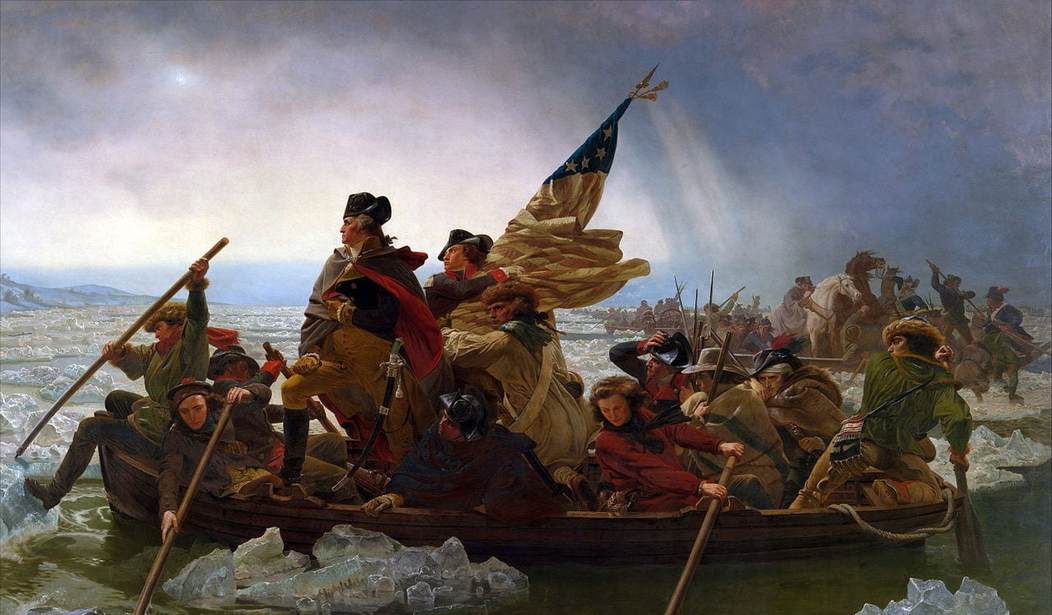Christmas time was bleak for the Continental Army shivering on the Pennsylvania side of the Delaware River. The threadbare army had been driven out of New York by a series of brilliant maneuvers by British General William Howe, and the Continentals now stood on the precipice of defeat.
To make matters worse, the 20,000 men Washington had in the field when the campaign started had been whittled down to less than 3,000 by the time Christmas 1776 came.
America was barely a country. Congress had decamped from Philadelphia, leaving Washington in command of military and civil affairs. Loyalists were cheering the end of the war and telling patriots in the street that they were going to enjoy going to their hanging.
If all that wasn't bad enough, the enlistments of most militia soldiers were up on January 1. Washington gathered his little army and gave a speech about sacrifice and country. 2,500 soldiers enlisted for another six weeks.
Washington was an offensive-minded soldier and hated being on the defensive. So he settled on Trenton, N.J., as the target and came up with a brilliant, audacious attack plan that promptly fell apart when the guns began to fire.
The story of the Battle of Trenton is that despite the Continentals' numerous errors and chances to be discovered, the Hessians were still asleep around 8:00 a.m. when they were attacked.
The Hessian force at Trenton numbered 1,400 under the leadership of Colonel Johann Rall. Although Rall had received warnings of colonial movements, his men were exhausted and unprepared for Washington’s attack—though rumors that they were drunk from Christmas celebrations are unfounded.
As he approached the town, Washington divided his men, sending flanking columns under General Nathaniel Greene and General John Sullivan. Meanwhile, Colonel Henry Knox’s cannons fired on the garrison. Rall attempted to rally his troops but was never able to establish a defensive perimeter, and was shot from his horse and fatally wounded. The Hessians quickly surrendered. All told, 22 were killed, 92 wounded, 918 captured and 400 escaped in the Battle of Trenton. The Americans suffered two frozen to death and five wounded.
Another column Washington sent in a flanking effort got lost and never made it to the battlefield. The two frozen Continentals died on the brutal nineteen-mile march from the Delaware River to Trenton. Some men indeed made that march barefoot. But many of the soldiers had been sickened by dysentery, and the two men collapsed on the road to Trenton and passed away.
After the battle, Washington loaded up on supplies, recrossed the Delaware River, and waited. His strategic sense was brilliant. Already having won a great victory, Washington crossed the river back into New Jersey on Dec. 30 and massed his troops in Trenton. Then, when Howe tried to surround the Americans, Washington had 500 men maintain campfires all night while he marched his troops clear around the British and took the town of Princeton. It was a sharp battle during which Washington astonished his men by riding between lines, exposing himself to withering fire from the British.
The wavering Americans were stiffened by Washington's immortal phrase, “Parade with me my fine fellows, we will have them soon!” The Americans beat back the British and marched to Morristown, where the Continental Army went into winter quarters.
Related: 'Wreaths Across America' Remembers the Fallen
The decisive importance was made plain a few weeks later when Howe realized how vulnerable his outposts in New Jersey were and pulled them back to New York.
The military victory was tiny — two minor outposts won, and there were still 30,000 British troops in New York.
But the propaganda victory cannot be measured. Trenton and Princeton revived the flagging spirits of patriots and came at a time when many were advocating that a peace treaty be signed.
The Battle of Trenton made Washington a national hero. If he had never accomplished anything else in his life, he would have been remembered as one of the greatest Americans who ever lived.
That those battles are just a part of the tapestry of Washington's life speaks volumes about his enduring hero status and why his legacy will never die.










Join the conversation as a VIP Member